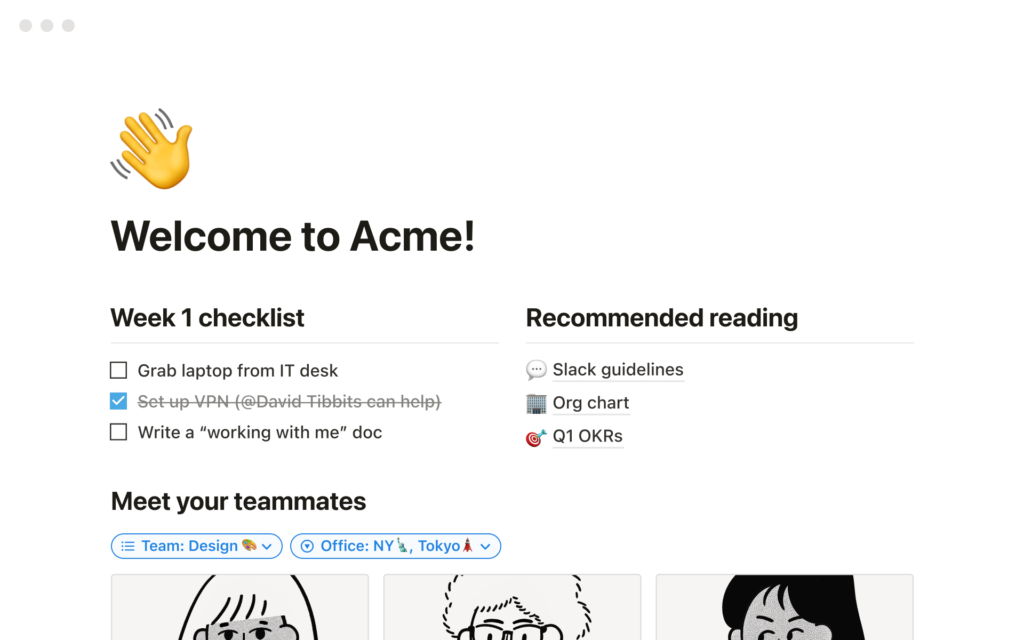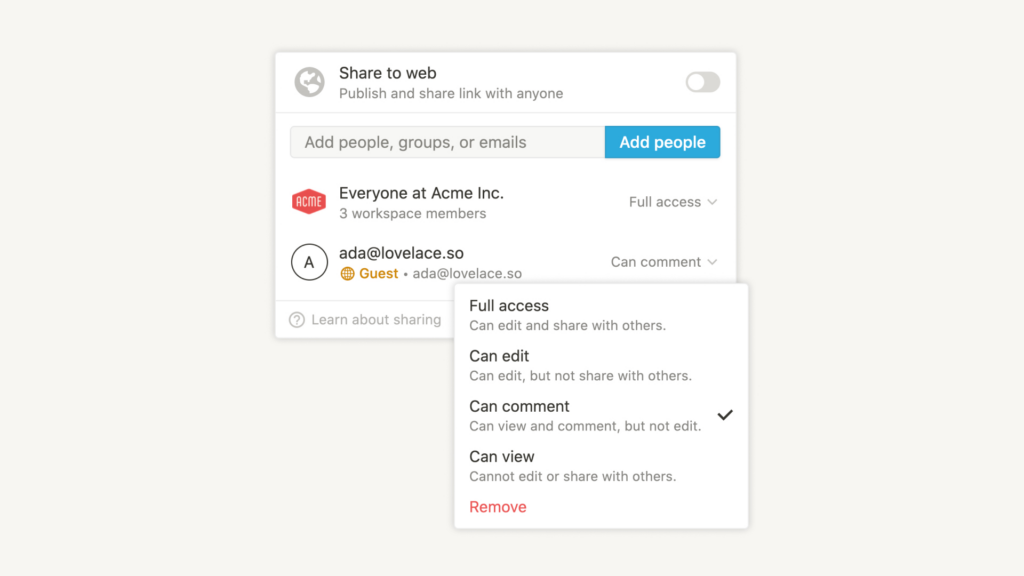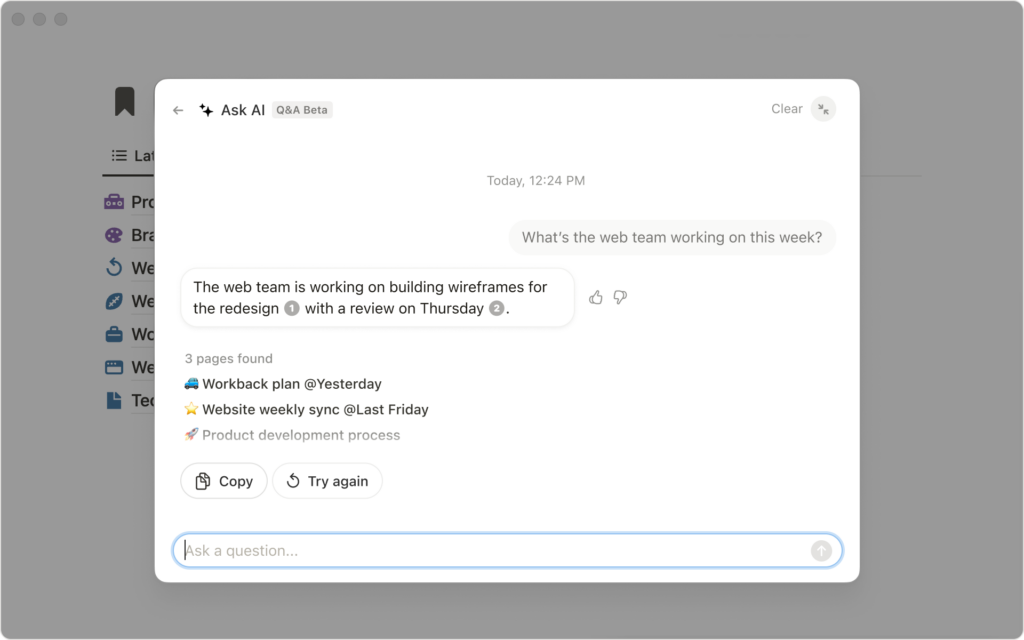Evernote was once the go-to for note-taking, a reliable second brain. But times have changed. With continuous updates and improvements, Notion is becoming a productivity powerhouse, offering more than just simple notes. It’s a customizable workspace that adapts to your needs with a sleek design and powerful features. This has many wondering: Is it time to leave Evernote behind? In this article, we’ll compare Notion and Evernote to help you decide if making the switch is right for you.
Table of contents
Notion vs. Evernote: Feature comparison table
| Feature | Notion | Evernote |
|---|---|---|
| Ease of use | More powerful but more complex organization | Simple and intuitive |
| User interface | Sleek, modern, customizable | Traditional, can feel cluttered |
| Learning curve | Moderate | Low |
| Note-taking | Rich text, multiple types, slower experience | Quick, multiple types, OCR feature |
| Projects and tasks | Build your own project/task management workflow | Simple task features |
| Workspace structure | Modular blocks (text, images, to-do lists, databases, etc.) | Notes organized in notebooks/stacks |
| Flexibility | High, create various productivity systems | Decent in note-taking, limited elsewhere |
| Web clipper | Simple, effective, text and image capture | Multiple capture types, full page, screenshots |
| Collaboration | Real-time editing, comments, @mentions, shared workspaces | Note sharing, basic commenting |
| Platform availability | Web, Windows, macOS, iOS, Android | Web, Windows, macOS, iOS, Android |
| File upload limit | 5 MB on free plan | 250 MB per month on free plan |
| Special features | Customizable templates, AI capabilities | Advanced search, complete offline access |
| Mobile app experience | Less intuitive, web wrapper style | Polished, native to platforms |
| Integrations | Growing number of 3rd party integrations | More established integration ecosystem |
| Pricing | Free plan; Paid starts at $12/month | Free plan; Paid starts at $14.99/month |
Why choose Notion

- You want complete control over how your workspace looks and functions.
- You need more than just notes; databases and wikis would be useful.
- Internal linking between ideas and pages is important for you.
- You enjoy exploring community ideas and templates.
- Powerful AI support.
- A free plan with plenty of features.
Why choose Evernote

- Your main focus is taking and organizing all types of notes.
- Optical Character Recognition (OCR) for handwritten notes.
- Focus on simplicity with a streamlined interface.
- You rely heavily on saving content from the web.
- You frequently need to work on notes without internet access.
Notion vs. Evernote: Which one is better?
So, what really sets Notion and Evernote apart? Let’s dive into the core features and philosophies that make each tool unique.
1. Notion is more complete but has a steeper learning curve
Notion’s standout strength is its adaptability.
Think of it like a set of digital building blocks – combining text, images, databases, to-do lists, and more to create a workspace perfectly tailored to your needs.
This makes it ideal for complex projects, knowledge management, or replacing multiple specialized tools.
However, let us say that this flexibility comes with a cost. Mastering Notion takes time and effort, as there are many features and potential configurations to explore, like recurring tasks. It’s worth the effort, though.

Evernote shines in its core mission: capturing and organizing notes.
Its interface prioritizes streamlined note creation, tagging, and powerful search capabilities.
You can easily clip articles, images, and files directly from the web into your Evernote notebooks.
Unlike Notion, Evernote has a shallower learning curve.
If your primary need is collecting and managing various notes, Evernote’s focus and intuitive design may offer a smoother user experience.
2. Evernote is more beginner-friendly
Evernote’s appeal lies in its streamlined approach to note-taking and organization.
The interface is intuitive and focuses on the essentials, creating notes, assigning tags, and using the powerful search function to find them later.
While Notion offers extensive customization, this can be overwhelming for users who want a simple, out-of-the-box note-taking experience.
If you favor a tool that works well without extensive tinkering, Evernote may be a more comfortable starting point.

With Evernote, you only need to click the green + New Note button at the top of the left panel, while Notion requires setting up a new page first and customizing it to your needs.
3. Notion is better for managing projects
Notion’s adaptability makes it a powerful foundation for building a custom project management system.
Its block-based structure and database capabilities go far beyond Evernote’s note-taking focus, allowing you to create the exact workflow that fits your project needs. That’s why we love it!
Whether you prefer Kanban boards, timelines, or simpler task lists, Notion can adapt. Unlike Evernote, Notion lets you centralize not just tasks but also project documents, wikis, meeting notes, and other essential resources.

Keep in mind that while Notion offers immense potential, building a comprehensive project management system does require some initial setup. You might need to explore templates or create your own custom configurations.
Evernote is a more straightforward option for basic project tracking, and it lacks the power and flexibility to manage truly complex projects.
👉 Learn more: 10 Best Kanban Software
4. Notion is better for teams and collaboration
Notion is better for collaboration and teamwork. Here’s what it offers:
- Real-time collaboration: Multiple team members can edit the same page simultaneously, seeing each other’s changes in real time. This facilitates brainstorming sessions, live meeting note-taking, and project updates.
- Comments and @mentions: You can leave comments on specific blocks of content and use @mentions to notify colleagues, ensuring discussions are focused and actionable.
- Shared workspaces: Designate entire workspaces for specific teams or projects. Control access with granular sharing permissions to keep everyone on the same page.
- Page history: Notion tracks page changes, allowing you to revert to previous versions if needed. This provides a safety net for collaborative editing.
- Customization and versatility: Teams can tailor their workspaces to fit specific needs and workflows.
Evernote’s note-centric design makes large-scale collaboration less intuitive than Notion’s. Individual notes can be shared, and basic comments can be added, but Evernote lacks the ability to connect notes or pages in an overarching workspace structure. This can lead to scattered information and difficulty tracking progress or discussions across multiple notes.
Evernote lacks Notion’s granular permissions and workspace organization. Notion allows for the creation of dedicated team spaces with fine-tuned access controls, ensuring the right people see the right information.

In essence, Evernote’s approach is simpler, offering less control over who can view and edit specific sets of content. This can be problematic for complex projects with varying levels of access needed.
5. Evernote has better search features
Sometimes, we don’t really stop to appreciate how much time a good search feature can save us, especially when we have hundreds or even thousands of items. This is the case with the search function on Evernote, which is much better than Notion’s. Here’s what it offers:
- Advanced search. You can search by title, keywords, dates, or types of content (such as audio or images). This includes the ability to search within PDFs, Office documents, images, presentations, and scanned documents, making it highly effective for locating specific information in a vast array of notes.
- Search handwriting (OCR). A unique feature of Evernote is its ability to search within handwritten notes, photos of whiteboards, and Post-It® notes. This handwriting recognition capability is particularly useful for those who often take handwritten notes or use Evernote to capture whiteboard sessions.
- AI-powered search. Evernote has introduced AI-powered search, which allows users to search their notes using natural language queries. This means you can ask direct questions or request Evernote to filter notes for you, receiving results quickly and intuitively.
- Advanced search options. Evernote’s search offers advanced filters and operators. This lets you refine your query using tags, dates, notebooks, and more, ensuring you find precisely what you’re looking for.

6. Notion offers generative AI
Notion offers a generative AI subscription. To use it, simply press the space bar, and you can write a prompt or choose the action that will appear from the dropdown menu. It’s as simple as that. Here are some of the new capabilities:
- Question and Answer (Q&A): The Q&A functionality in Notion AI allows you to extract information and gain insights from wikis, projects, and documents simply by asking questions.
- Assistance with writing and documentation: Notion AI helps users overcome writer’s block by assisting in drafting documents. It can generate first drafts, rewrite technical jargon for broader understanding, and even translate content into multiple languages.
- Content generation and summarization: The AI in Notion can analyze large databases and produce actionable insights, summaries, and other relevant information. For instance, it can automatically generate meeting summaries or distill key points from sales calls and research sessions.
👉 Related: Notion AI vs. ChatGPT: Which AI Tool Is the Best for You?

7. Notion has a much better free plan
Notion’s free plan offers more extensive features. Here’s what you get in both apps:
| Feature | Notion free plan | Evernote free plan |
|---|---|---|
| Note creation | Unlimited pages and blocks for individual users. | Limited to 50 notes and 1 notebook. |
| File uploads | File uploads up to 5 MB per file. | Maximum note size of 200 MB; total monthly upload limit of 250 MB. |
| Device sync | Sync across multiple devices. | Limited to one device. |
| Collaboration | Invite up to 10 guests to your workspace. | Collaboration features are limited; sharing individual notebooks is possible. |
| Version history | Access to 7-day page version history. | Not specified in the available sources. |
| Additional features | Basic page analytics; access to Notion Calendar; basic automations. | Access to tasks, calendar, and home personalization features. |
Conclusion
So, which one should be your next tool? The decision between Notion and Evernote depends entirely on your specific needs and how you envision organizing your projects.
👉 You can choose Notion if: you want maximum flexibility, you like to create customized systems and you need a complete collaborative environment.
👉 You can choose Evernote if: your primary focus is fast note-taking, powerful search, and a streamlined interface.
Ready to take your organization to the next level?
If you want to easily connect Notion with other essential productivity tools like Google Calendar and Todoist, explore 2sync. Our service makes it easy to create powerful workflows and ensure your information flows effortlessly across your favorite apps in one unified workspace.



